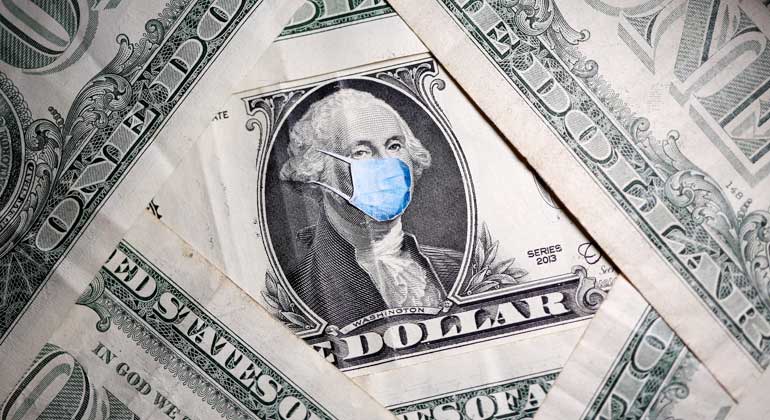
THE WORLD’S top central banks are urging governments to put concerns about mounting debt aside for now and keep spending until the economic recovery from the coronavirus is complete.
Their calls are being met with pushback in some countries, where the question of how to pay for rescue efforts is creeping up the agenda. But the International Monetary Fund (IMF), historically a champion of budget restraint, says they have a point.
The Fund is due later Wednesday to publish its most detailed study of the pandemic’s impact on public finances. Chief Economist Gita Gopinath warned Tuesday of a “long, uneven and uncertain ascent” ahead after the worst slump in generations, with poverty rising and unemployment still high — and said it’s too early for policy makers to withdraw support.
That case was made with growing urgency by central bankers heading into this week’s IMF annual meeting. European Central Bank chief Christine Lagarde kicked off the online-only event by saying her biggest concern is that fiscal aid to workers and businesses may get phased out too abruptly.
A parade of Federal Reserve officials led by Chair Jerome Powell lined up last week to make the same argument with regard to the US, where talks on the next dose of pandemic stimulus have been deadlocked for months in Congress. Fed officials said their own tools, such as another round of bond buying, won’t be as effective as government spending.
The message from the most powerful central banks is increasingly clear: there are limits to what monetary policy can do to help in the short run. Fiscal authorities — who can borrow at rock-bottom interest rates, and possess tools better-suited to deliver a rapid and targeted boost — will have to finish the job.
Mr. Powell and Ms. Lagarde are pushing back against the “myth of the omnipotent central bank” capable of fixing any problem in the economy, said Paul Donovan, global chief economist at UBS Wealth Management in London. “They can’t always solve it,” he said. “This is not a credit crunch. Cutting the cost of credit isn’t going to stimulate the economy.”
The backdrop is a global rebound that’s losing momentum — and a risk that politicians who already injected some $12 trillion of stimulus, according to IMF estimates, will balk at spending more as debt levels hit records.
The fiscal rescue added 3.7 percentage points to global growth in 2020, according to JPMorgan Chase & Co. — preventing the coronavirus rout from being roughly twice as bad. But JPMorgan economists expect that boost to turn into a drag next year, as stimulus gets choked off in a repeat of “policy missteps” that hobbled recoveries after the 2008 crash.
Central banks have supported public spending by buying up swaths of the debt that governments issue. They typically insist bond purchases are aimed at pushing inflation up to target levels, and don’t amount to monetary financing of budget deficits.
Some warn that such policies could tie the hands of central banks when it’s time to raise interest rates — and undercut their autonomy in the longer run.
Excessive government debt could mean “a central bank is de facto forced into making its decisions dependent on their impact on public finances,” Swiss National Bank President Thomas Jordan said last week.
In the UK, where the government is starting to talk about raising taxes to plug the budget gap, at least one former policy maker has accused the Bank of England (BoE) of turning into an arm of the Treasury. But BoE Governor Andrew Bailey says fiscal spending is still appropriate, and its Chief Economist Andy Haldane points out that the UK economy has grown its way out of bigger debt burdens in the past.
Mr. Powell’s vocal engagement in the US debate has reportedly drawn objections from several Republican senators opposed to bigger government outlays. It’s gotten even some supporters worried.
“I’m a little uncomfortable with how explicit the Fed has been in talking so bluntly about fiscal policy, even though I completely agree with what they’ve been saying,” Adam Posen — a former BoE policy maker and now president of the Peterson Institute for International Economics — said on a recent conference call.
The worry is that central bankers, who’ve often had to beat back political encroachments into their own monetary policy turf, can put their independence at risk by straying outside it.
But Fed officials are driven by awareness that they’re short of ammunition, according to Bill Dudley, head of the New York Fed for a decade through 2018.
“They are reaching diminishing returns in terms of how their tools affect the economy,” said Mr. Dudley, now a scholar at Princeton. “It’s not that they can’t do more, but doing more wouldn’t do much. That’s precisely why they are talking about the need for fiscal policy.” — Bloomberg
